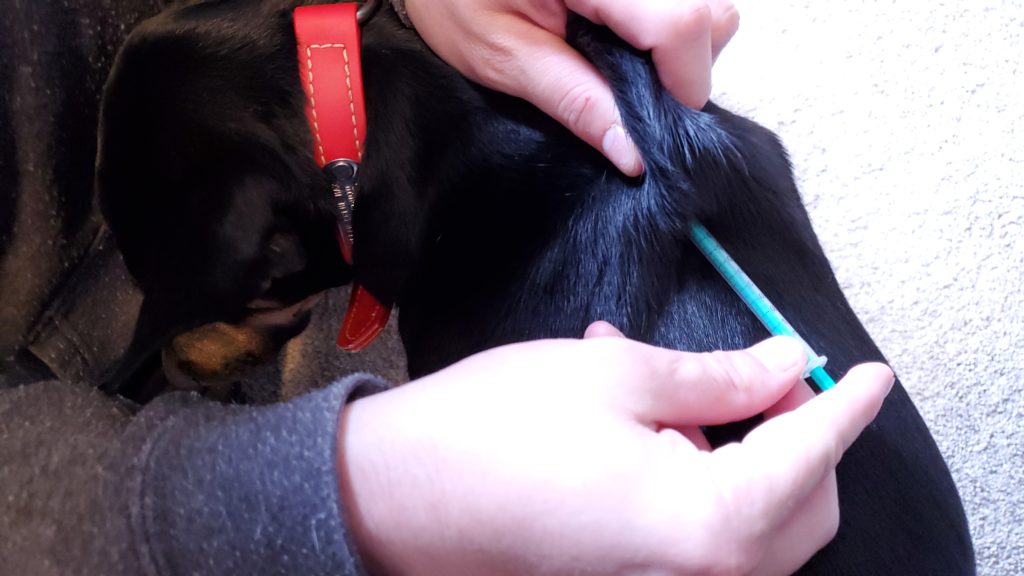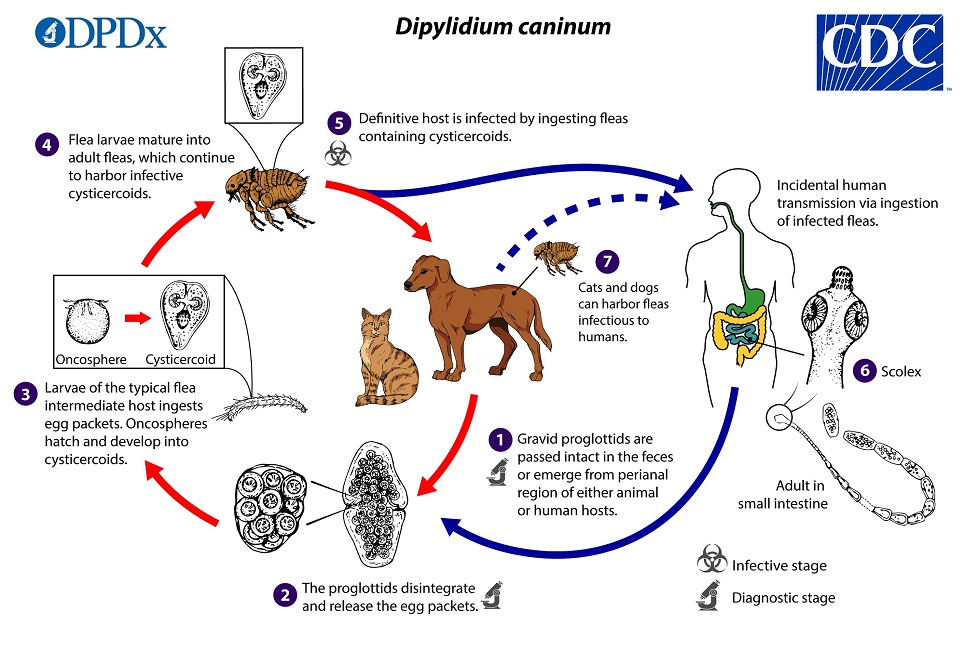Use Of Information
Information shared here is intended to help dog owners make the best decisions possible for their own dogs and opinions shared should be evaluated using the reader’s own judgement.
De-Wormers
Roundworms
Worms are one of the most common parasites that dogs, especially puppies, get treated for. In fact, roundworms are so common in newborn puppies that a routine dewormer is given to puppies at 2, 4, 6, 8 and 12 weeks of age. For puppies, pyranel pamoate (also used to treat pinworms in humans) is commonly used. The mechanism of action involves temporary paralysis of parasitic roundworms so whatever leaves your dog’s body is likely still alive, though your dog will be healthier.
Heartworms
The “gold standard“, ivermectin, is one of the most robust, well used and widely available anti-parasitic roundworm compounds. Ivermectin can also help to treat some tick, lice and mite infestations(1). Most importantly however, when studying the ability of Ivermectin to kill adult heartworms in dogs, researchers found that “long-term monthly administration of the macrocyclic lactone (ML)ivermectin has been shown to be macrofilaricidal against D. immitis (canine heartworm). [Others] have reported that monthly administration of prophylactic doses of ivermectin resulted in complete elimination of adult worms in experimentally infected dogs in 36 months.”(2) In combination with pyratnel pamoate, Ivermectin is sold under the trade name of Heartgard for the treatment of roundworms, hookworms and heart worms.
Tapeworms
For tapeworms, the most common active ingredient is praziquantel. In order for your dog to get infected with tapeworms, they must ingest an infected flea (direct ingestion or from eating small mammals with fleas) that contains the tapeworm eggs. These eggs then embed into your dog’s digestive tract, mature and start to produce eggs which leave via your dog’s feces. Most tablet, multiple de-wormer treatments contain both prazquantel and pyranel pamoate in combination to treat both tapeworms and round/hook worms.
Because canine tapeworms need fleas to act as intermediate hosts, the key to preventing and treating tapeworms involves effective flea preventatives.
Flea and Tick Prevention
Fipronil
 Fipronil is a synthetic compound that is the main active ingredient in frontline (S-methoprene is also present in frontline plus). A study looking at the efficacy of kill for fleas on dogs at 3h and 8h post application of fipronil found an efficacy of 35.9 and 46.5%. That means out of 1000 fleas, 3hours after treatment, 359 were killed while after 8 hours, 465 were killed (3).
Fipronil is a synthetic compound that is the main active ingredient in frontline (S-methoprene is also present in frontline plus). A study looking at the efficacy of kill for fleas on dogs at 3h and 8h post application of fipronil found an efficacy of 35.9 and 46.5%. That means out of 1000 fleas, 3hours after treatment, 359 were killed while after 8 hours, 465 were killed (3).
Imidacloprid

Imidacloprid is another synthetic compound used in Advantage flea treatments (along with pyriproxyfen). In the same study as referenced for fipronil, researchers found a 22.2 and 95.7% kill efficacy for fleas after 3hours and 8 hours respectively.
Nitenpyram

Nitenpyram is somewhat similar in structure to Imidacloprid and was found to be 99.1% effective after 3hours and 100% effective after 8hours. Nitenpyram is the active ingredient in CAPSTAR.
Permethrin

Most people are familiar with permethrin because it makes hunting in the spring and early summer tolerable. Sold as a 0.5% solution by Sawyer, this chemical can be sprayed onto clothes, tents and is even safe for dogs. It is also effective against a wide variety of pests including ticks, fleas, spiders and chiggers.
Routine Vaccines
Vaccines are essential to the health and well being of your dog, especially young puppies. However, for owners who have had multiple dogs, visits to the vet for the sole purpose of a vaccine that end up costing over a hundred dollars can seem exorbitant. On top of that, most recommended vaccination schedules require at least four separate vet visits during a puppies first year of life so the costs can quickly add up! Thankfully, there are options to keep your dog healthy and also save some money too.
Local Clinics and Shelters
Most cities or counties have local shelters that offer vaccines at significant cost savings. Most are simply administered by a vet tech which helps with the cost but don’t expect a thorough examination of any other aspects of your dogs health. Most pet feed stores will also host a local clinic which can be a convenient way to get your dog vaccinated as well.
Self Administered
If you are willing to learn, and are confident that you can administer vaccines, this can also save you a lot of money. Most local feed stores will have livestock vaccines and now also include basic vaccines for your dog.To administer the vaccine, simply pinch the skin on the nape of your dog’s neck and insert the syringe under the skin but not into any muscle.

It is also very important to note that in most areas of the US, rabies vaccinations must legally be administered by a licensed veterinarian.
Shampoo
This seems like common sense to most folks, but the reality of most dog shampoos is that they contain the same ingredients as essentially dish soap and lotion but at a significant markup. A smart alternative is too just use dish soap but that can dissolve and remove many of the essential oils that a dog’s coat and skin requires. In this case, simple baby shampoo can be a better alternative as it is designed to dissolve less of the oils which helps prevent fur and skin from drying out. It also has the added benefit of having less scent than most dish soaps and can help prevent your dog from immediately rolling in the smelliest part of the yard after a shower (we’ve all been there).
Rural Veterinarian
The last area to consider is the actual location of your vet. We all need to take our dog’s to the vet for very important reasons, but which vet you go to has a considerable impact on the cost. For example, I live 30 minutes outside of a major metropolitan area in KY. If I drive 10 minutes closer to the city, the local vet costs about $250 for an average visit. In contrast, if I drive 10 minutes further from the city, the county vet charges me on average $100 per visit and I get in and out much quicker with less markup and no pressure to buy a new dog food, flea control, Lyme disease vaccines etc.
Economics
Bulk Ingredients
Cost/eq Imidacloprid = $0.02
Cost/eq Permethrin = $0.48
Cost/eq Pyroproxyfen = $0.04
Bulk Nitenpyram
Cost/eq Nitenpyram = $0.09
Analysis
Clearly the cost for an equivalent amount of the active ingredient in each case is much cheaper than the cost for an individual dose (over 50x markup) but that additional cost comes with assurance from the manufacturer that the product is safe for use on pets. In many cases, the use of concentrated insecticides is not approved for use on pets. and may even be illegal. Any attempt to administer products to pets in a manner not supported by the manufacturer may result in the death of your pet.
Citations
(1)Chemical and Engineering News. Oct 9, 2017 Issue. “Drug Resistant Roundworms Prompt Search for New Treatment.”
(2)Veterinary Parasitology 169 (2010) 347–351
(3)Veterinary ParasitologyVolume 112, Issue 3, 10 March 2003, Pages 249-254
(2)https://doi.org/10.1096/fasebj.4.15.2253847
Image Credit: US Center For Disease Control/DPDx




